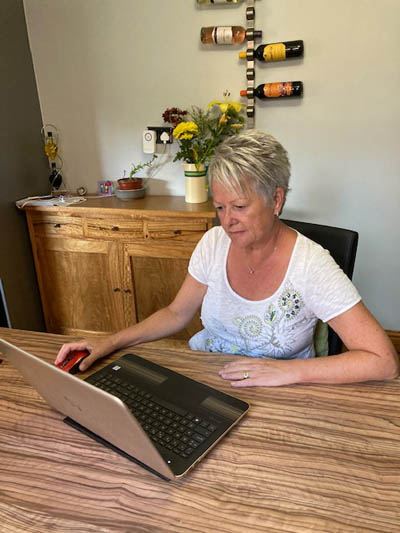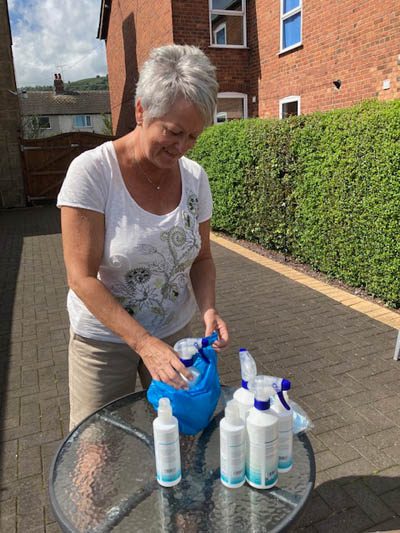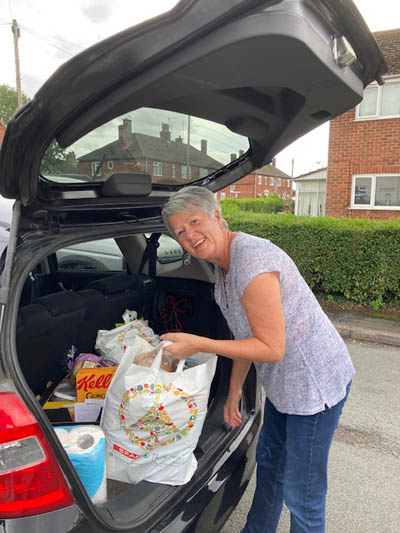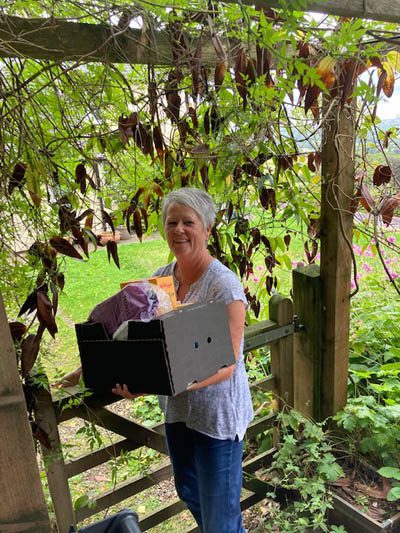Part Four: Coordinating the Strategy
In the previous three articles, we saw how the Hope, Caergwrle and District Voluntary Action Group emerged to assist self-isolating or vulnerable people in their local community. We’ve mentioned Gill Pearson, the key person behind the Alyn Villages Covid-19 Response group throughout the lockdown, several times in those articles and now we tell her story.
Love Wrexham Magazine tracked Gill down for comments on her role as coordinator of the project:
“As an occupational therapist working in the care of the elderly sector, I was mindful that as lockdown approached, there would be vulnerable people within the community who would need support. I was conscious of the pressure that Social Services were under. I was also aware that the Local Authority would struggle to respond to the demand.”
Enhanced DBS Status
 Gill’s initial ensured the group adopted adequate safeguarding procedures when making deliveries to vulnerable people. Additionally, it was quite apparent that these residents were open to exploitation and specific requirements needed to be in place.
Gill’s initial ensured the group adopted adequate safeguarding procedures when making deliveries to vulnerable people. Additionally, it was quite apparent that these residents were open to exploitation and specific requirements needed to be in place.
“I suggested that all volunteers should have enhanced DBS (Disclosure and Barring Service) status. Latterly, Flintshire Local Voluntary Council (FLVC) confirmed this status as a requirement for all volunteers providing community support. Therefore, we made sure we collected copies of DBS certificates and driving licences and saved them into a password-protected Word document.”
Gill found that local pharmacy and shopkeepers were already aware of the residents who needed support. As a consequence, she worked closely with them to guide the volunteers:
“I liaised with the regional manager of the chemist and the managers of the local Spar and butchers to discuss a strategy that would work efficiently. I then drew up a service operations plan (SOP), including risk assessments and lone working procedures. This SOP became part of a welcome pack for volunteers joining the group.”
“Mother Hen”
 Gill took responsibility for the well-being of members of the group as well as those receiving support. This action included ensuring the provision of personal protective equipment and hand sanitiser. She also checked their safety as lone-workers:
Gill took responsibility for the well-being of members of the group as well as those receiving support. This action included ensuring the provision of personal protective equipment and hand sanitiser. She also checked their safety as lone-workers:
“I sometimes felt responsible for the safety of the volunteers. If a volunteer was going to complete a task and didn’t message to say they had finished, I would send them a text message to ensure they were OK. I suppose this is because of my experience as a health professional working in the community and following lone-working procedures. I think some of the volunteers must have thought I was a bit of a ‘mother hen’”.
“Mother hen” or not, it is certainly the hallmark of a good manager to care about the well-being of their staff.
“Particularly Satisfying”
 Later in the project, when the lockdown was beginning to ease, several volunteers began to return to work. Consequently, there were fewer people to complete tasks. As Gill was working part-time from home, it was quite challenging for her to plan her week knowing that she may need to step in unexpectedly. Even so, Gill commented on how rewarding it was to help others:
Later in the project, when the lockdown was beginning to ease, several volunteers began to return to work. Consequently, there were fewer people to complete tasks. As Gill was working part-time from home, it was quite challenging for her to plan her week knowing that she may need to step in unexpectedly. Even so, Gill commented on how rewarding it was to help others:
“I found it particularly satisfying that our group was able to reduce the risk to vulnerable community members. It was also lovely to see some familiar faces I hadn’t seen in years! We weren’t just a delivery service, but an opportunity for those isolating to have a good socially-distanced chat. It was heartwarming there were so many people willing to support those in need.”
The volunteers came from different backgrounds and contributed a wealth of knowledge and talent. A true natural resource for the community.
Gill believes it is important that communities develop resilience to deal with future crises:
 “This process has enabled us to identify several vulnerable individuals who may need further support going forward. We now also have a natural source of dedicated volunteers we can approach in the event of a second peak. Additionally, we can count on these people for any future support needs not eligible for statutory services.
“This process has enabled us to identify several vulnerable individuals who may need further support going forward. We now also have a natural source of dedicated volunteers we can approach in the event of a second peak. Additionally, we can count on these people for any future support needs not eligible for statutory services.
Even now, we are now entering uncharted waters with fears of a second wave of the virus during the winter months. Although the group has a developed model they can use to help, everyone hopes that won’t be necessary.”
A Special Event
On Sunday, 13th September, the organisers invited the volunteers and their families to a barbecue courtesy of Park in the Past in Hope to say thank you and celebrate everyone’s efforts during the coronavirus lockdown. It was a socially-distanced event with fewer than 30 participants in line with Welsh Government regulations.
Local County Councillors Gladys and Dave Healey sponsored the food and the Spar in Caergwrle donated some bottles of wine and chocolates. Direct Kayaks stayed open late so volunteers had the opportunity to try out kayaking on the lake. Those who took part expressed thanks to the organisers, Direct Kayaks and members of Caergwrle Boys Brigade for their assistance with the barbecue.

David Healey
Readers are welcome to contact the author with any news or views at dhealey204@aol.com or by calling 01978 761 523.
For details about the Hope-Caergwrle-Abermorddu-Cefn y Bedd Mutual Aid Group, please go here.
Read more of our articles on your local community by clicking here.

